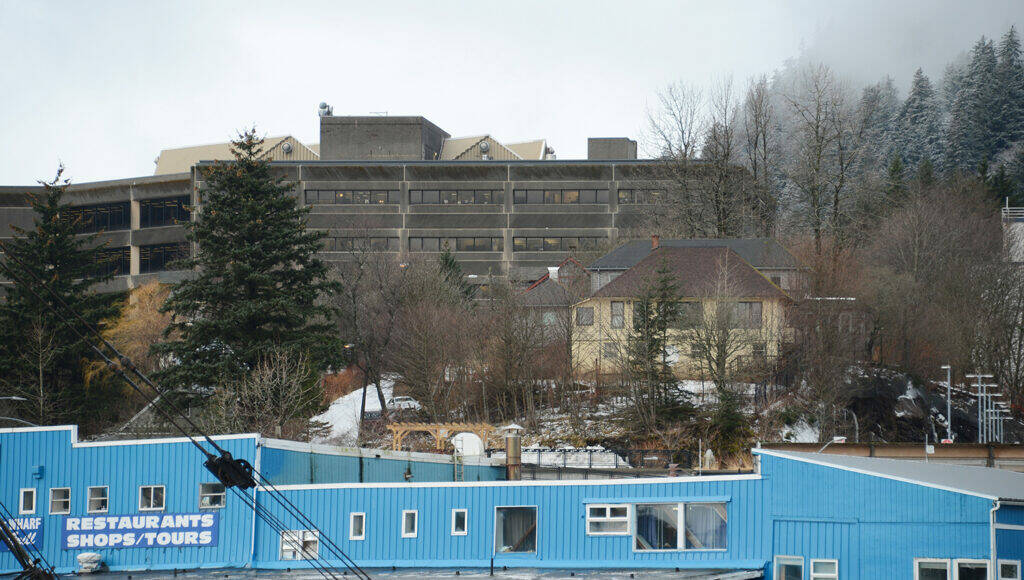The state of Alaska is returning to the City and Borough of Juneau a multimillion-dollar plot of land once envisioned for a new Capitol building.
On Tuesday, acting Department of Natural Resources Commissioner Vasilios Gialopsos signed an order transferring Telephone Hill, a historic residential area overlooking downtown Juneau, to the capital city.
The transfer was required under legislation written by Sen. Jesse Kiehl, D-Juneau, and passed by lawmakers earlier this year, ending an almost 50-year-old project intended to construct a new Capitol for the Alaska Legislature.
“It really needs to be in the hands of the city,” Kiehl said in August. “It’s going to lead to some better use of that parcel, with full public participation on what that looks like.”
The transfer won’t be final until city officials sign an affidavit releasing the state from liability, which would allow the deed to be signed over, said DNR natural resource specialist John King.
Juneau officials have already been considering their options, including using the property for a new city hall.
In October, local voters rejected a proposal to borrow $35 million to build that new city hall, but because the bonding proposition failed by less than 3 percentage points, city manager Rorie Watt said city officials believe voters may have liked the idea of a new city hall, just not the particular plan on the ballot.
Kiehl said he doesn’t care for the city hall idea.
“This is really prime real estate,” he said. “It could be anything from hotel and condo — various housing options, hopefully with an inclusive low-income element — to large-scale light commercial. I’m not inclined for that to be the city hall, though I do think Juneau needs to own its own much larger city hall.”
The residents of Telephone Hill are also concerned by the idea. Since Kiehl’s legislation passed, they’ve been in limbo and subject to unenforced eviction notices.
In September, resident Tony Tengs testified to the city assembly, saying it doesn’t make sense to demolish homes during a housing crisis.
Telephone Hill is Juneau’s oldest historic neighborhood, home to the oldest still-occupied house in Alaska, the Edward Webster House, built in 1882. Seventeen people live in the neighborhood’s seven properties, a city survey found in August. None of the homes in the area are eligible for historic recognition because they have been modified, but all date from before 1920 and are some of the oldest homes still standing in Alaska.
The neighborhood has been owned since 1984 by the state, which was considering construction of a new Capitol and acquired the site in anticipation. The city contributed $2 million to the state’s purchase of the properties on the hill, under the condition that it be developed for a new Capitol building.
That never happened, owing in part to the cost of the project and the unpopular result of a city-sponsored 2005 Capitol design competition. Meanwhile, the city charged the state interest on its $2 million investment. By 2008, the figure had reached $6.4 million, and the state and Juneau signed an agreement that said the debt would be forgiven if the land was given to the city.
When Gov. Mike Dunleavy entered office in 2018, he ordered a review of surplus state-owned land across Alaska, and Telephone Hill — then owned by the Department of Transportation and Public Facilities — was identified as a prime candidate for disposal.
After Kiehl’s legislation passed, DOT transferred Telephone Hill to DNR in preparation for the ultimate transfer to the city. That ended a decades-long leasing arrangement with the neighborhood’s remaining residents, who received eviction notices in August.
Those notices have never been enforced, and Watt said the city has no intention to do so. For the meantime, residents are on month-to-month leases with the city, which is also in charge of managing the property.
How long the status quo remains in place will be up to city officials once the local government takes full control.
“There are any number of good possibilities,” Kiehl said in August, “and frankly, the opportunities for redevelopment of any lot downtown are tremendous.”
• James Brooks is a longtime Alaska reporter, having previously worked at the Anchorage Daily News, Juneau Empire, Kodiak Mirror and Fairbanks Daily News-Miner. This article originally appeared online at alaskabeacon.com. Alaska Beacon, an affiliate of States Newsroom, is an independent, nonpartisan news organization focused on connecting Alaskans to their state government.

